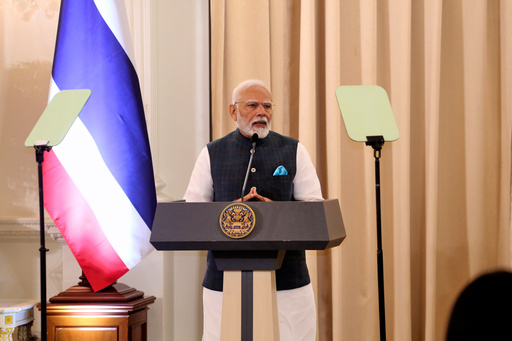BANGKOK — Myanmar’s military leader, Senior General Min Aung Hlaing, made a rare international journey to Thailand on Thursday to attend a regional summit. This trip marked a significant step as Myanmar continues to grapple with the aftermath of a catastrophic earthquake. The quake claimed thousands of lives and left the nation reeling.
Min Aung Hlaing has faced widespread criticism from Western countries due to his role in the military coup that ousted Aung San Suu Kyi’s elected government and the subsequent aggressive crackdown on dissenters. His participation in meetings of the Association of Southeast Asian Nations (ASEAN) has been restricted since the military takeover in February 2021. Despite this, he traveled to Bangkok to join other regional leaders for a summit focused on nations bordering the Bay of Bengal.
This was Min Aung Hlaing’s first international visit outside the circle of Myanmar’s core supporters, namely China, Russia, and Belarus, since he attended a meeting in Indonesia in 2021. His arrival at the airport was met with a formal reception hosted by Thailand’s Labor Minister, Phiphat Ratchakitprakarn. That evening, he participated in an official dinner as part of the Bay of Bengal Initiative for Multi-Sectoral Technical and Economic Cooperation (BIMSTEC), comprising countries such as Thailand, Myanmar, Bangladesh, Bhutan, India, Nepal, and Sri Lanka.
The summit cropped up as Myanmar works tirelessly to locate survivors amid the devastation caused by a 7.7 magnitude earthquake that struck the region the previous week. The earthquake resulted in the destruction of thousands of structures, the crumbling of bridges, and the buckling of roads. As of Thursday, the death toll stands at 3,085, with more than 4,700 reported injured, and over 300 people still missing, according to a military report.
This natural disaster compounded an already exacerbated humanitarian crisis linked to Myanmar’s ongoing civil conflict. The United Nations had flagged that over 3 million people were displaced, and almost 20 million required assistance even before the earthquake hit.
The Thai Ministry of Foreign Affairs shared that discussions during the BIMSTEC ministerial meetings focused on disaster management strategies. Notably, this meeting was postponed from the previous year due to the abrupt dismissal of then-Prime Minister Srettha Thavisin by a court ruling. The earthquake also claimed the lives of at least 22 individuals in Bangkok, primarily due to the collapse of an under-construction high-rise building.
Min Aung Hlaing’s presence at the summit has sparked outrage and ire among his detractors. Myanmar’s shadow National Unity Government (NUG), formed by lawmakers who were denied their positions, criticized his participation, claiming it lacks legitimacy. The NUG called for BIMSTEC to revoke the military junta’s participation in the summit immediately.
Additionally, the activist group Justice for Myanmar expressed that Min Aung Hlaing’s inclusion at the meeting legitimizes the military junta, which the people of Myanmar have opposed for over four years, potentially tarnishing BIMSTEC’s reputation as a regional entity.
In response to the criticism, Thailand’s Ministry of Foreign Affairs refuted claims that the invitation damaged its reputation. The ministry’s spokesperson, Nikorndej Balankura, highlighted that according to the BIMSTEC charter, it is Thailand’s obligation to invite the leaders of all member countries to such summits.
Among other prominent figures attending were Muhammad Yunus, Bangladesh’s chief advisor, and Indian Prime Minister Narendra Modi, adding further significance to the gathering.


